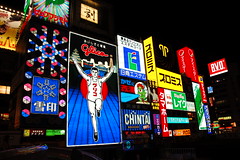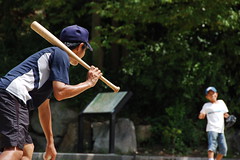The Future is Now (Update #11)

Upon landing in Japan I was expecting to be guided by multi-lingual robot assistants to a mag-lev bullet train which would take me directly to my destination. This did not happen. I obviously had some misconceptions about how advanced this country was. But after more than a week I've come to appreciate the subtle but brilliant design prevalent here.
For instance,
Taxis: Drivers can push a button to automatically close the rear doors.
Fridges: The door can open to the left and to the right.
QR codes: Lots of products feature 2D bar codes (called QR). If you photograph the barcode with your camera-phone, it will automatically retrieve extra information from the internet, such as nutritional information of McDonalds burgers from the wrappers.
Toilets: I've already mentioned the automatic lid opening and wiping, but even more brilliant is the tank refilling system: A tap pours water into a basin where you can wash your hands, before draining down into the tank to be used for the next flush. So you've washed your hands without using any extra water and without touching any door handles or faucets.
The people here are so very polite. It's very nice of course, but when an everyday encounter with say, a cashier, involves an endless stream of polite formalities it must begin to lose some meaning. There's even a really funny statement I've heard a few times to say 'Thanks', which is "sumimasen arigato gozaimas" or literally "sorry thank you" plus a polite suffix word at the end, for extra politeness!
More on the (polite) culture of Japan:
- While watching The Dark Knight in theatre (it just came out in Asia last week), the movie ended and the credits started rolling. I got up and went to leave but when I reached the doors I noticed the lights still hadn't come on. And nobody else had gotten up! Fascinated, I stayed to see how long they would wait. The entire audience sat through the whole credits.
- With no cars coming from either direction, people will stand at an intersection endlessly awaiting the 'Walk' sign. I don't hesitate to j-walk here, which was the norm in China. In fact more than a few times in China I triggered mass mob j-walks where dozens of people stepped off the curb with me to cross a busy street, stopping all traffic despite our clear absence of right of way.
- Public sleeping is totally acceptable, and you see people napping all over the place. Sometimes I wake up (hey, when in Rome..) on the inter-city train to find no less than half the passengers dozing. And as Afton pointed out after living here, people have an amazing ability to wake up just in time for their stop.
I've put up some more photographs accompanied by explanations on my flickr set (click the thumbnail!)
Matane,
-Mike
Rising Sun (Update #10)

I have continued my eastward trend and have come to Japan. Before commenting on all the zany things this country has, and how completely different two neighbouring countries can be, I'll say a few things about China:
I spent 64 days in China including Hong Kong, and visited 17 provinces. There is far more to see but I think I covered much of it, leaving for another time the furthest reaches of the north-east and the south-west. The country is a world unto itself: The history is long, the country vast, the population enormous, and the ethnic variations rich. Most of the young people desperately want to travel within their own borders before ever considering moving away or traveling outside of China. Many even have shockingly little knowledge about the outside world -- because to them, like I highlighted earlier, China is the world.
I spent my final days in Beijing eating Peking Duck and having engaging discussion with Oker (who spent longer in China than I, and speaks the language), and returning to the restaurant a few nights later for the most expensive dinner of the trip with Jordan. In between, Jordan and I visited the most hiliariously menu'd restaurant in China Our choices included (rewritten exactly as shown):
- Heat the oil Splash at Similar Stick The Noodles
- Like Helmets The Noodles [this was actually Naan bread]
- Northwest sheep face
And our favourite,
- Sour odor hot amorphopallus riveri filament [a bowl of noodles]
We laughed until we cried and the waitress who spoke zero english must have thought we were mad.
We also visited the Olympic buildings, with great difficulty. We couldn't ride the metro to them without tickets, and after crossing one section of an intersection passing 23 police officers (and not that many tourists) we found the bus that took us nearby the Bird's Nest and Water Cube buildings. As you've probably all seen from watching the spectacular opening ceremonies last night, the buildings are truly magnificent. But what you didn't see is the distasteful military barracks -- complete with camoflouge trucks, portable trailers and tall razor wire fencing -- that they've dumped in front of those wonderful buildings.
So, I'm in Japan, a land where toilets sense your approach and welcomingly open their lids and heat up the seat; and if you're feeling adventurous you can press a button and experience a refreshing but tickling spray of water to do the wiping for you. At this moment I'm not writing to you from a toilet -- though that would be pretty cool -- but from an internet & manga (comic book) cafe. My spacious private cubicle has a padded floor, beanbag chair, and sheets. I'm staying the night by buying a night package for $20, and they even have free drinks and a shower. This is a far cry from the warehouse-sized cafes in China where a sea of young people hack away at each other's virtual selves in online video games.
Culture Shock summary, so far:
- when taking the train in Japan I noticed demarcated lines on the floor where people calmly queue; and passengers disembark the trains before the others embark. In China a wave of embarking passengers push their way onto trains as you exit by swimming salmon-like through them.
- after a spectacular fireworks display in Kyoto I noticed all the people carrying their rubbish out of the park with them. In China the streets and public places are spotless, but not because people are clean. On the contrary -- people through trash wherever they please -- but an army of migrant workers roam public streets and parks cleaning up.
- Japanese being much richer are consequently larger. I have noticed far more obesity, and also much taller people here than in China. But people are also more active here, running or playing baseball in the parks; whereas in China people seem to be more sedentary but stay slim through healthy diet and very light exercise. (You'll often come across groups of 50+ people performing Richard Simmons-esque light aerobics)
- My first impression of how people appear differently is that Japanese tend to have larger eyes, noses, and jaws than Chinese; and the women have shorter legs.
- I realized what a monoculture China is in terms of style. Most young people dress very conservatively, but the women very elegantly. Business men tend to wear formal pants and shoes with golf-shirts. But in Japan the style is of the extreme kind. Businessmen wear formal suits with jackets in 35 degree heat. Some young people have outreageous bleached hairdos, heavy makeup, glasses frames you'd wear in Halloween, wild hats -- many young people even dress in traditional kimonos with wooden sandals -- the variation is endless.
Its quite daunting to be once again completely incapable of communication. All that Mandarin down the toilet! So far everyone in Kyoto and Hiroshima has fundamental english comprehension, but this won't be the case in the countryside. I'm finding Japanese much harder to pickup than Chinese, because everything is at least triple the syllables to remember. It doesn't help that most verbs and many nouns have polite suffixes that must always be added. Or that sentences are constructed subject-object-verb; or that that counting up numbers and counting up objects are completely different numbering systems. *sigh* I'll just point at the phrasebook or mime my way around the country.
Click the thumbnail above for more great photographs and stories.
Sayonara,
-Mi-e-ku Fu-ra

